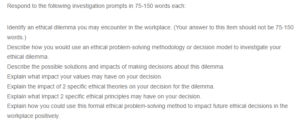Healthcare Management – Ethical Dilemma
Ethical Dilemma In My Workplace
The common ethical dilemma in my workplace is protecting the patient’s confidentiality and privacy. In the nursing profession, privacy and confidentiality issues with patients present severe ethical challenges. If improperly handled, it could have legal ramifications and a detrimental effect on healthcare professionals. While protecting their patients’ interests and working for their mutual benefit, nurses should respect patients’ autonomy. When clients are independent, they can refuse treatments, medications, or surgeries (George & Bhila, 2019). Even if it goes against the opinion of physicians or other healthcare practitioners, nursing personnel must respect and implement this decision. Need help with your assignment ? Reach out to us. We offer excellent services.
An Ethical Problem-Solving Decision To Solve The Dilemma
Since the Health Insurance Portability and Accountability Act (HIPAA) safeguards personal health information, there are specific guidelines and processes for protecting patients’ confidentiality. I will first review the ANA code of ethics to address the dilemma of patient confidentiality and privacy. I will then identify essential principles and values and determine which values or principles are most pertinent to the problem. Creating an action plan in line with the dilemma and carrying out the action plan will be the next step. Lastly, I will consider the results of this moral decision-making procedure.
Impacts And Solutions To The Dilemma
Safeguarding the patient’s confidentiality, privacy, and security of medical data is essential for several reasons. Ensuring privacy and confidentiality can help patients and doctors communicate more effectively, which is essential for improving the quality of care, boosting autonomy, and minimizing effects on society, humiliation, and unfairness. (George & Bhila, 2019). The overall perspective is that privacy and confidentiality are vital because they support or facilitate other essential values, particularly notions of personhood like the capacity to make judgments on one’s own, respect for diversity, human dignity, and the worth of all patients.
Impact Of My Values On The Dilemma Decision
My values, such as caring and respecting the patient’s dignity, positively impact my ethical problem-solving decisions. Usually, the patient’s rights include respect for their privacy and confidentiality. Developing a successful and trustworthy interaction with patients and promoting their calmness and happiness depends on respecting their confidentiality. For instance, confidentiality precludes healthcare professionals from releasing information that a patient has provided to them; hence, patients will be comfortable and confident when sharing their private information.
Impact Of Ethical Theories On The Dilemma Decision
Utilitarian and rights ethical theories consider privacy as a fundamental human right or virtue having inherent value. They believe that preserving autonomy and privacy is a means of recognizing the characteristics that give persons their moral uniqueness. (MacKinnon & Fiala, 2014). The opinions provided by patients provide a significant amount of evidence in favor of the utilitarian theory. It shows that disclosure without authorization is likely to discourage some patients from getting treatment; thus, it is apparent that they value confidentiality and regard it as crucial in a medical session. The privacy rights defined by a code of ethics are upheld and accorded the greatest priority in ethical rights theory.
Impact Of Ethical Principles On The Dilemma Decision
Protecting patients’ privacy is necessary to uphold the nonmaleficence principle. Privacy and confidentiality violations are harmful and impact a patient’s dignity. It can lead to prejudice, embarrassment, and stigma. Therefore, with some promise of anonymity, patients may be able to give their doctors open and honest disclosures of confidential information (MacKinnon & Fiala, 2014). The respect for patients principle also emphasizes the value of personal autonomy. Ensuring that people can decide when and if to disclose sensitive data to others is one method to respect patients and promote individual liberty.
Application Of The Ethical Problem-Solving Method To Promote A Positive Effect On Future Workplace Ethical Decisions
To enhance future patient privacy and confidentiality, I will apply an ethical problem-solving method by establishing comprehensive guidelines and privacy agreements. I will conduct regular training workshops for all the staff to highlight the importance of confidentiality standards and refresh their understanding of staff responsibilities and expectations. I will also ensure that all data is stored on protected platforms and limit mobile phone use in patient rooms to prevent future dangers to patient confidentiality.
References
George, J., & Bhila, T. (2019). Security, confidentiality, and privacy in the health of healthcare data. Int. J. Trend Sci. Res. Develop, 3(4), 373-377.
MacKinnon, B., & Fiala, A. (2014). Ethics: Theory and contemporary issues. Cengage Learning.
ORDER A PLAGIARISM-FREE PAPER HERE
We’ll write everything from scratch
Question

Healthcare Management – Ethical Dilemma
Respond to the following investigation prompts in 75-150 words each:
Identify an ethical dilemma you may encounter in the workplace. (Your answer to this item should not be 75-150 words.)
Describe how you would use an ethical problem-solving methodology or decision model to investigate your ethical dilemma.
Describe the possible solutions and impacts of making decisions about this dilemma.
Explain what impact your values may have on your decision.
Explain the impact of 2 specific ethical theories on your decision for the dilemma.
Explain what impact 2 specific ethical principles may have on your decision.
Explain how you could use this formal ethical problem-solving method to impact future ethical decisions in the workplace positively.
Cite at least two reputable references according to APA guidelines. One reference must be your textbook, Ethics: Theory and Contemporary Issues. Reputable references include trade or industry publications, government or agency websites, scholarly works, textbooks, or other sources of similar quality.

